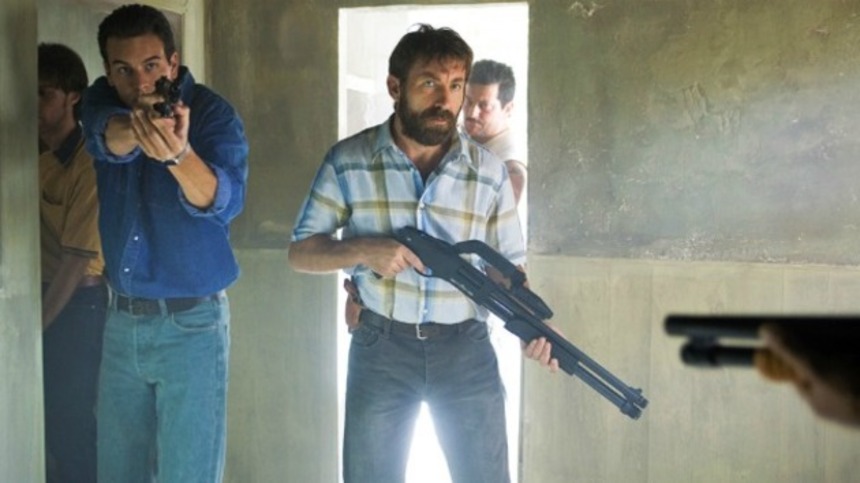Fantastic Fest 2012 Review: UNIT 7

So as a fan of crime and cop flicks, there's much that I love about Alberto Rodríguez's Unit 7 (aka Grupo 7): its stylistic boldness and energy, its evocation of a particular time and place (Seville of 20+ years ago), and, yes, its sudden and explosive violence. But in between being generally thrilled by the direction, editing, and cinematography -- all of which are technically superb -- I was disappointed by the worn-out situations, relationships, and overall thrust of the drama. The full weight of this disappointment didn't really hit until the houselights went up -- that's when I could no longer hope that Unit 7's story would break new ground or deliver some characters who'd stay with me for a long time.
We get the young hothead cop with the pretty wife and young child, the one who's eager to prove himself. He's paralleled by the stoic, hardboiled veteran for whom relationships are a novelty, if not a chore. We've even seen, probably more than once, the emotional role reversal that eventually occurs as the brutality of the former increases while the basic decency of the latter is revealed. In these roles Mario Casas (Neon Flesh) and Antonio de la Torre (The Last Circus) are never less than convincing, and the rest of the team (it's only two other guys) pretty much fill in the comic relief roles. (And, as a casting aside, look for Extraterrestrial's Julián Villagrán as a lowlife.) The swagger of these guys, their audaciousness when they hit their stride as crime-stoppers is both infectious and mortifying, and in fact recalls one of my favorite television shows ever, The Shield. You wonder how they could possibly get away with stuff even as you're not sure if you want them to.
The problem is that there's no real dramatic payoff in terms of the character arcs of the principals, but instead a rather tepid resolution that sees them "older but wiser." Which is too bad, really, because there are some electrifying scenes in the run-up to the end -- including one of public humiliation that's harrowing in its built-up tension and dread. It could be that through such scenes, and the obligatory climactic shoot-out, Rodríguez and co-writer Rafael Cobos may have felt that they had fulfilled their end of their bargain, especially given how many subplots and incidents they work into the story.
Indeed, you may leave the theater feeling that you've seen an entire mini-series in 92 minutes -- it's amazing how much is packed in -- but is it the kind of mini-series that will haunt you, that you'll want to see again? Doubtful. Aiming for an epic crime movie that takes place over years is a wonderful ambition, and we've seen many classic films constructed on that model. In this case, though, the script fatally sacrifices depth for breadth. As additional proof of this, check out what happens to the female characters, where they start and where they end up. We get some good performances, some nice moments and possibilities, but in the end these characters are treated as story fodder: clues to motivation, prompts to action, and little else.
- But are individuals worth saving if they don't really want to be saved?
- Is what we call "crime" just a particular roped-off section of a corrupt society rather than something to be compartmentalized as that which only "bad guys" do?
- At what point does law enforcement become dangerously reified -- that is, a construct that's wholly divorced from actually serving the community?
This review was originally published during Tribeca 2012.

Do you feel this content is inappropriate or infringes upon your rights? Click here to report it, or see our DMCA policy.






